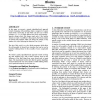Free Online Productivity Tools
i2Speak
i2Symbol
i2OCR
iTex2Img
iWeb2Print
iWeb2Shot
i2Type
iPdf2Split
iPdf2Merge
i2Bopomofo
i2Arabic
i2Style
i2Image
i2PDF
iLatex2Rtf
Sci2ools
122
click to vote
ATAL
2003
Springer
2003
Springer
Designing Self-Assembly for 2-Dimensional Building Blocks
In this paper we present a genetic algorithm-based approach towards designing self-assembling objects comprised of square smart blocks. Each edge of each block can have one of three polarities (+1, -1 or 0) which defines how blocks stick together opposite charges attract, like charges repel, and a 0 face neither attracts nor repels. In addition to this property, the block contains an internal state machine which can change the polarity of any number of its sides following the detection of an "event". The aim of this work is to evolve block parameters which allow the self-assembly of desired basic structures that can be used as primitive building blocks for the assembly of more complicated objects. We detail a genetic algorithm-based approach towards evolving the state machine logic, with a fitness measure based on the difference of the final shape from some desired goal or target shape. The experimental results show that the genetic algorithms can find optimal rule sets and ...
| Added | 06 Jul 2010 |
| Updated | 06 Jul 2010 |
| Type | Conference |
| Year | 2003 |
| Where | ATAL |
| Authors | Ying Guo, Geoff Poulton, Philip Valencia, Geoff James |
Comments (0)

